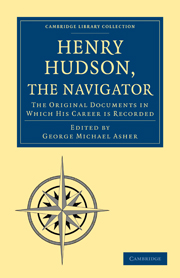Book contents
- Frontmatter
- Contents
- Introduction
- Notes to Introduction
- DIVERS VOYAGES AND NORTHERNE DISCOVERIES
- Divers voyages and northerne discoveries of that worthy discoverer Henry Hudson, from Purchas' Pilgrims, vol. iii, pp. 567-610
- A larger Discourse of the same Voyage and the success thereof, written by Abacuk Pricket
- A note found in the deske of Thomas Wydowse, student of mathematics, one of them who was put into the shallop
- Purchas his Pilgrimage, folio, London, 1626, p. 817. VI. Of Hudson's discoveries and death
- Hudson's first voyage (1607), from Edge's brief discoverie of the Muscovia merchants
- Captain Fotherby's statement concerning Hudson's Journal of his first voyage
- Hudson's third voyage (1609) from Van Meteren's Historie der Nederlanden. Folio, Hague, 1614, fol. 629a
- Extracts relating to Hudson's third voyage (1609), from John de Laet's Nieuwe Werelt, fol., Amsterdam, 1625, 1630-1
- Extracts containing some original information about Hudson's third voyage, from Mr. Lambrechtsen van Ritthem's ‘History of New Netherland’
- Extracts concerning Hudson's third voyage (1609), from Adrian van der Donck's ‘Beschryvinge van Nieuw Nederlandt,’ 4to., Amsterdam, 1655, 1656
- American traditions concerning the third voyage (1609)
- An Extract from Captain Luke Foxe's description of Hudson's fourth voyage (North-West Fox) p. 70
- Hessel Gerritz's various accounts of Hudson's two last voyages, from the Latin and Dutch edition of the ‘Descriptio et Delineatio Geographica detectionis Freti ab H. Hudsono inventi.’ Amst., 1612, 1613: I. Hudson's fourth voyage. A summary printed on the back of the chart. An account of the voyage and new found strait of Mr. Hudson
- APPENDIX
- Index
- Plate section
Extracts concerning Hudson's third voyage (1609), from Adrian van der Donck's ‘Beschryvinge van Nieuw Nederlandt,’ 4to., Amsterdam, 1655, 1656
Published online by Cambridge University Press: 05 August 2011
- Frontmatter
- Contents
- Introduction
- Notes to Introduction
- DIVERS VOYAGES AND NORTHERNE DISCOVERIES
- Divers voyages and northerne discoveries of that worthy discoverer Henry Hudson, from Purchas' Pilgrims, vol. iii, pp. 567-610
- A larger Discourse of the same Voyage and the success thereof, written by Abacuk Pricket
- A note found in the deske of Thomas Wydowse, student of mathematics, one of them who was put into the shallop
- Purchas his Pilgrimage, folio, London, 1626, p. 817. VI. Of Hudson's discoveries and death
- Hudson's first voyage (1607), from Edge's brief discoverie of the Muscovia merchants
- Captain Fotherby's statement concerning Hudson's Journal of his first voyage
- Hudson's third voyage (1609) from Van Meteren's Historie der Nederlanden. Folio, Hague, 1614, fol. 629a
- Extracts relating to Hudson's third voyage (1609), from John de Laet's Nieuwe Werelt, fol., Amsterdam, 1625, 1630-1
- Extracts containing some original information about Hudson's third voyage, from Mr. Lambrechtsen van Ritthem's ‘History of New Netherland’
- Extracts concerning Hudson's third voyage (1609), from Adrian van der Donck's ‘Beschryvinge van Nieuw Nederlandt,’ 4to., Amsterdam, 1655, 1656
- American traditions concerning the third voyage (1609)
- An Extract from Captain Luke Foxe's description of Hudson's fourth voyage (North-West Fox) p. 70
- Hessel Gerritz's various accounts of Hudson's two last voyages, from the Latin and Dutch edition of the ‘Descriptio et Delineatio Geographica detectionis Freti ab H. Hudsono inventi.’ Amst., 1612, 1613: I. Hudson's fourth voyage. A summary printed on the back of the chart. An account of the voyage and new found strait of Mr. Hudson
- APPENDIX
- Index
- Plate section
Summary
This country was first found and discovered in the year of our Lord 1609; when, at the cost of the privileged East India Company, a ship named the Half Moon was fitted out to discover a westerly passage to the kingdom of China. This ship was commanded by Henry Hudson, as captain and supercargo, who was an Englishman by birth, but had resided many years in Holland, and was now in the employment of the East India Company. This ship sailed from the Canary Islands,1 steering a course north by west; and after sailing twenty days with good speed land was discovered, which by their calculation lay 320° by west. On approaching the land, and observing the coast and shore convenient, they landed, and examined the country as well, as they could at the time and as opportunity offered.
The country having been first found or discovered by the Netherlanders, and keeping in view the discovery of the same it is named the New Netherlands. That this country was first found or discovered by the Netherlanders, is evident and clear from the fact that the Indians or natives of the land, many of whom are still living, and with whom I have conversed, declare freely, that before the arrival of the Dutch ship, the Half Moon, in the year 1609, they (the natives) did not know that there were any other people in the world than those who were like themselves, much less any people who differed so much in appearance from them as we did.
- Type
- Chapter
- Information
- Henry Hudson the NavigatorThe Original Documents in which his Career is Recorded, pp. 167 - 172Publisher: Cambridge University PressPrint publication year: 2010First published in: 1860



